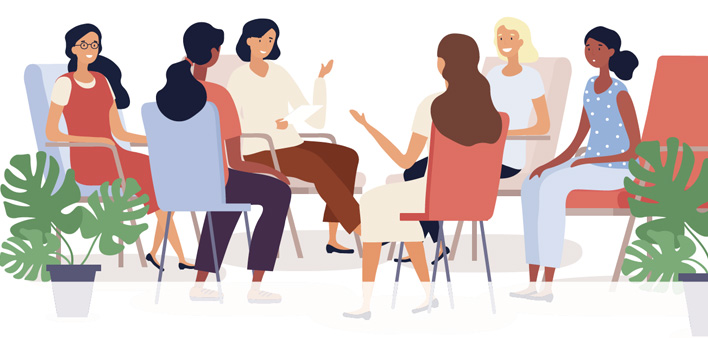Suicide Awareness

By Shelley Galasso Bonanno, MA, LLP
“Anything that’s human is mentionable, and anything that is mentionable can be more manageable. When we can talk about our feelings, they become less overwhelming, less upsetting and less scary. The people we trust with that important talk can help us know that we are not alone.” Fred Rogers
Once unmentionable, suicide is now not only mentionable but being addressed with increased frequency. Mental health support has become not only more accessible but increasingly talked about, in part due to the rising rates of depression seen during the COVID-19 pandemic.
Historically, statistics reveal an estimated one million people per year die by suicide or about one person in 10,000 (1.4 percent of all deaths).” The American Association of Suicidology estimates that for every one death by suicide, there are between 100 and 200 attempts. But suicide can be prevented and eliminating stigma and reducing suicide attempts is vital in efforts to decrease the rate of suicide.
In the words of Fred Rogers, “If it can be mentioned it can be managed.” It was once a common belief that talking about suicide may put thoughts into someone’s head they might not have otherwise entertained. This is a misconception. A scientific review, which investigated the common fear that inquiring about suicide and related behaviors may bring about or prompt suicidal thoughts, revealed that in fact there was no statistically signifi cant increase in suicidal ideation among study participants who were asked about suicide. It further indicated that acknowledging and talking about suicide may, in fact, reduce rather than increase suicidal ideation, leading to improvements in mental health among people who seek professional help.
While it was initially predicted by many that suicides would significantly increase during the pandemic, due in part to the increased rate of depression, statistics from The Journal of the American Medical Association (JAMA) revealed a 5.6 percent decrease in deaths by suicide in 2020 compared to the year before. This seems to contradict our initial fears. Why is that?
During the past year, largely due to the COVID-19 pandemic, there has been increased focus on mental health. The State of Michigan and many agencies have offered additional and often no-cost access to mental health treatment. Ways to manage depression have been discussed openly and those in positions of infl uence, such as community leaders, professional athletics, and performers have spoken openly about their own struggles with depression and anxiety. These actions have resulted in people being more likely to reach out for familial support, medical and psychological treatment. With everyone facing similar struggles, those who need help are more apt to feel it is okay to ask for it.
The value of obtaining help is immeasurable. Much research has been conducted regarding suicide, and one typical study reveals about seven percent of men and one percent of women who have ever been diagnosed with depression die by suicide. Studies further suggest the lifetime risk of suicide for patients whose depression goes untreated is nearly 20 percent, while the risk for treated patients shows a dramatic decrease of a mere 0.141 percent.
According to the CDC there are 12 warning signs of suicide to be aware of – feeling like a burden, being isolated, increased anxiety, feeling trapped or in unbearable pain, increased substance use, looking for a way to access lethal means, increased anger or rage, extreme mood swings, expressing hopelessness, sleeping too little or too much, talking or posting about wanting to die, and making plans for suicide.
If you or someone you love is experiencing suicidal thoughts, reach out. Do not try to handle the situation alone. Contact your primary care physician, a trusted member of your clergy, or a psychiatrist and/ or psychotherapist. If the thoughts are escalating, seek treatment at your nearest hospital emergency room.
In addition to seeking treatment from a licensed professional, there are other resources. In the U.S., call the National Suicide Prevention Lifeline at 800-273-TALK (800-273-8255) to reach a trained counselor. Use that same number and press “1” to reach the Veterans Crisis Line.
 A lifelong resident of Macomb County, Shelley Galasso Bonanno is a practicing limited licensed psychologist who earned her master’s degree from Wayne State University in 1987. She has a breadth of experience in working with adults, children, families, and couples. In addition to working in private practice, Ms. Bonanno performs consultative services for State and forensic agencies. She performs custody and parenting time evaluations and is a court approved mediator. Her writings have appeared in various online and print publications. An advocate for mental health, you can follow Ms. Bonanno on Twitter @shelleybonanno.
A lifelong resident of Macomb County, Shelley Galasso Bonanno is a practicing limited licensed psychologist who earned her master’s degree from Wayne State University in 1987. She has a breadth of experience in working with adults, children, families, and couples. In addition to working in private practice, Ms. Bonanno performs consultative services for State and forensic agencies. She performs custody and parenting time evaluations and is a court approved mediator. Her writings have appeared in various online and print publications. An advocate for mental health, you can follow Ms. Bonanno on Twitter @shelleybonanno.

